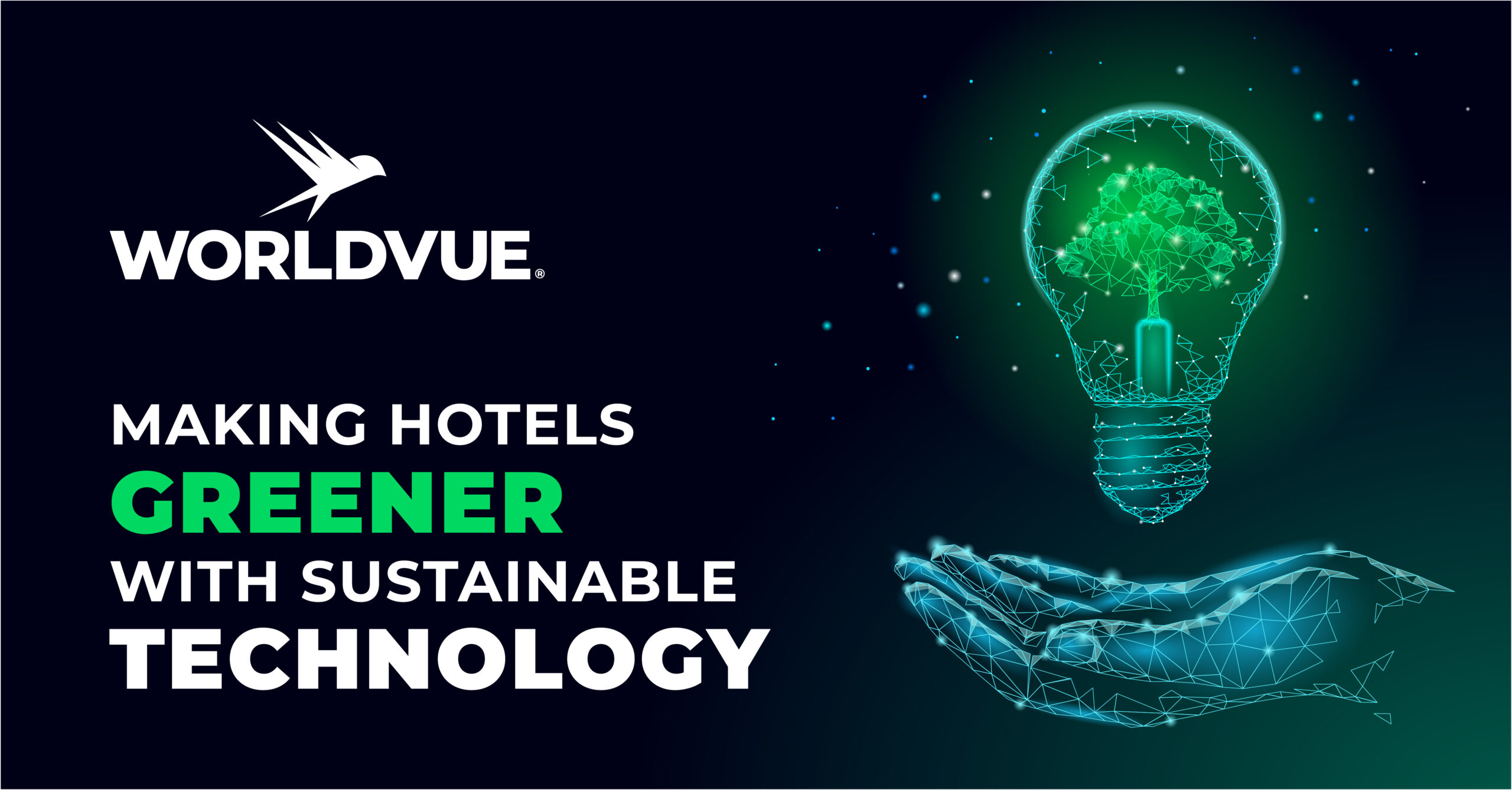Table of Contents
- Do guests actually care about sustainability?
- What are some technologies that can help a hotel become “greener” or operate more sustainably?
- Is there a positive revenue impact from eco-friendly technologies?
- Can these technologies be beneficial for different types of hotels?
- Here are some helpful links to learn more
In recent years, there has been increasing discussion of environmental impact in enterprise, and the hotel industry is no different. Sustainability, eco-friendliness, carbon neutrality, low-waste, “going green” – many brands, vendors, and industry groups are focusing on how hotels can be better for the environment.
Becoming more sustainable isn’t a matter of checking boxes – “Yep, we’re green now.” It’s an ongoing process of examining your operations to determine where you can improve. This can mean finding ways to use less water, changing how staff clean guest rooms, donating excess toiletries, implementing paperless check-in/check-out, or reusing materials.
Reducing consumption and waste should always be the first step in improving sustainability. As we’ll discuss below, there are a variety of technologies that can help hotels with this. But before investing in any of them, you might wonder: Is sustainability something my guests care about enough for me to spend on?
Do guests actually care about sustainability?
Yes! Travelers, especially millennials and GenZ, are becoming more environmentally conscious. As they learn to incorporate sustainable practices in their lives, they increasingly seek accommodations that align with those values. Traveling has the potential for many negative environmental impacts, and guests are increasingly considering how their travel impacts the world around them. In fact, more than 75% of guests in recent studies indicate that they want to travel more sustainably.
Brands that communicate their commitment to environmental responsibility can build trust with guests. But it’s not enough just to talk about it. The more you demonstrate sustainable practices, the more likely they’ll choose your property and leave positive reviews. They may even pay more to stay with you – at least half of guests in recent studies say they’d be willing to pay more for travel options that are certified sustainable.
Staying at a property that employs sustainable practices isn’t only about social responsibility and environmental impact. Many guests also consider it a matter of personal well-being. Sustainable practices often contribute to healthier indoor environments; this is crucial for guests who prioritize health and wellness.
It isn’t just your guests who care about sustainability. Hoteliers who own international properties may already be aware of government initiatives, including legislation and incentives, for businesses that operate more sustainably. And as discussions of sustainability increase, positive media coverage may also result from going green.
What are some technologies that can help a hotel become “greener” or operate more sustainably?
From big to small, there are many options available for hotels to incorporate sustainable technologies. You needn’t begin on the scale of solar farms, geothermal energy, water recycling systems, green roofs, or wind turbines (although all of those are great!). There are a variety of widely available technologies you can use in your hotel starting today. Here are a few of those most commonly in use now:
- Smart thermostats – Properties can update their HVAC systems and other energy solutions to more efficient options such as high-efficiency furnaces. One way to improve them even further is to incorporate smart thermostats. When used with sensors that detect whether a space is in use, smart thermostats can adjust the temperature so that the HVAC isn’t heating or cooling a space when no one is there.
- Smart lighting – Similarly, while many locations already use LED bulbs, smart solutions can make lighting even more efficient. Sensors can detect whether a space is in use, and the system can then turn lights on or off as needed.
- Leak and water sensors – Smart solutions for preventive maintenance can detect problems such as leaky faucets or toilets. Not only does this improve sustainability, but it can also lower your operating costs. A single leaky toilet can cost over $800 per year, not including the cost of water damage – so this can save money and prevent headaches!
- Air quality monitors – Air quality may not be as much of a factor for sustainability, but it is nonetheless an ecological issue. And with more guests now indicating wellness is important to them, improving your air quality is crucial. Air quality monitors can help you maintain a healthy indoor environment within your property.
- EV charging stations – UBS Bank forecasts that, by 2025, 20 percent of all new cars sold globally will be electric. As the demand for electric vehicles soars, EV chargers have become a sought-after amenity. Making EV chargers available will highlight your commitment to green initiatives and can even add LEED certification points to your property.
- AI-based solutions – Using smart solutions with AI-powered predictive analytics and insights can help hotels reduce energy consumption and save money.

Is there a positive revenue impact from eco-friendly technologies?
While there are initial costs associated with implementing sustainable technologies, there can be beneficial impacts on both short- and long-term revenue. Potential benefits include:
- Cost savings – Improving energy efficiency can lead to reduced resource consumption and operating costs and, thus, higher profit margins.
- Market differentiation – Implementing sustainable technologies can set your property apart in the market. This may attract environmentally conscious guests willing to pay a premium for eco-friendly accommodations.
- Guest loyalty – Similarly, establishing a reputation for environmental responsibility can encourage guest loyalty and repeat business and increase positive reviews and word-of-mouth referrals.
- Corporate demand – Businesses in many different sectors are prioritizing sustainability, leading them to choose hotels and event spaces that share their priorities. Offering eco-friendly amenities may make your property more appealing for corporate events and boost revenue from business clients.
- Government incentives – In some regions, there may be tax breaks, grants, or other incentives to adopt sustainable technologies.
Can these technologies be beneficial for different types of hotels?
Absolutely! Of course, the solutions you choose to implement will need to account for your budget, your market, and what makes sense for your specific property. But implementing sustainable technologies can make a positive impact on a variety of properties:
- Budget hotels – Sustainable technologies can help reduce operating costs and thus make pricing more competitive. Also, budget hotels can draw additional guests by promoting themselves as affordable, eco-conscious options.
- Luxury hotels – Sustainable technologies can be a draw for high-end guests who appreciate the combination of luxury and sustainability, especially when combined with a health-and-wellness angle.
- Resorts – Sustainable technologies can help resorts cooperate rather than compete with their natural surroundings. For example, solutions that help resorts use energy and water more efficiently can help preserve the local environment. They can also help attract guests seeking a destination that is both relaxing and eco-conscious.
- Hotels catering to business travelers – Corporate clients who share a focus on sustainability may appreciate energy-efficient systems and eco-friendly amenities. Technologies such as electric vehicle charging stations also help cater to business travelers.
- Boutique hotels – Sustainable technologies provide a unique selling point, helping boutique hotels stand out in a competitive market. This can be tied in with a hotel’s distinctive brand identity to attract eco-conscious travelers.
- Urban hotels – Sustainable technologies can benefit both urban hotels and their neighborhoods, for example, by reducing energy consumption and combating the heat island effect.
With an increasing number of sustainable technologies available to help hotels “go green” and an increasing number of benefits to doing so, now is an excellent time to investigate what options might work well for your property. WorldVue works with a variety of partners experienced in the implementation of sustainable technologies. We can help you find ways to make your hotel more sustainable and, therefore, more attractive to guests.
Here are some helpful links to learn more
- 2024 Is the Year of the Sustainable Hotel
- Sustainable Hotel Ideas: 25 Ways to Go Green
- Sustainable Hospitality Alliance
- Mending the Data Disconnect between Green Certifications, Hotels, and Consumers
- BWH Hotels Presents New ESG Program and WorldHotels Brand Story
- Choice Hotels Room to Be Green
- IHG Green Engage



